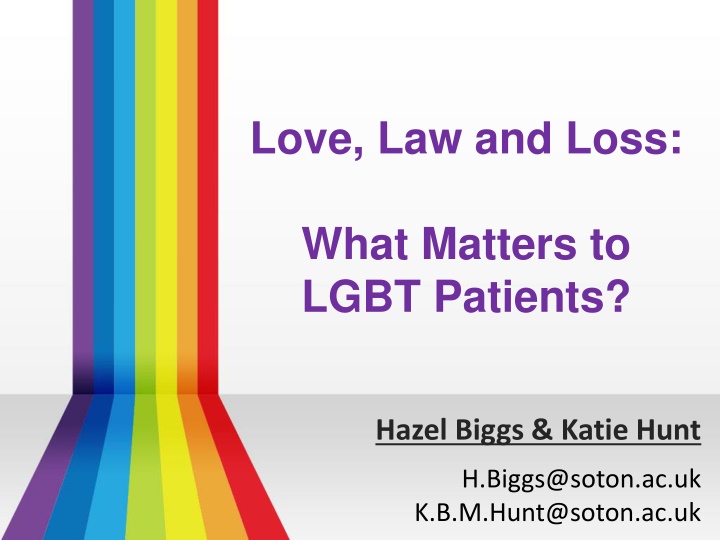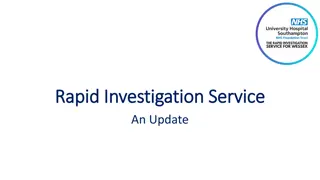
LGBT Patients: Unique Experiences and Challenges in Healthcare
Explore the unique healthcare needs and challenges faced by LGBT patients, from queer invisibility to concerns about discrimination. Learn about the importance of understanding their different bodies, families, and concerns to provide inclusive and respectful care.
Download Presentation

Please find below an Image/Link to download the presentation.
The content on the website is provided AS IS for your information and personal use only. It may not be sold, licensed, or shared on other websites without obtaining consent from the author. If you encounter any issues during the download, it is possible that the publisher has removed the file from their server.
You are allowed to download the files provided on this website for personal or commercial use, subject to the condition that they are used lawfully. All files are the property of their respective owners.
The content on the website is provided AS IS for your information and personal use only. It may not be sold, licensed, or shared on other websites without obtaining consent from the author.
E N D
Presentation Transcript
Love, Law and Loss: What Matters to LGBT Patients? Hazel Biggs & Katie Hunt H.Biggs@soton.ac.uk K.B.M.Hunt@soton.ac.uk
Queer Invisibility Lack of evidence on LGBT experiences of end of life care; these patients are under- represented in studies. Most LGBT research focuses on white, middle class, cisgender lesbians and gay men. Bisexuals, trans people and BAME people tend to be overlooked, both inside and outside the LGBT community.
Are LGBT patients different? The medical profession has a dark history of treating homosexuality. Fortunately, public attitudes have changed dramatically and healthcare professionals today are much more understanding. But, does a just like us narrative erase the unique experiences of LGBT patients?
Unique Experiences Thinking Points Do you know how many of your patients are LGBT? Different bodies Different concerns Why might these patients have different needs? Different families What might their past experiences of healthcare be like? LGBT Patients
Different Bodies There is evidence that sexual minorities in the UK Report poorer general health and primary care experiences. Are less likely to attend routine healthcare screenings. Have an increased risk of certain cancers. Are around 7 times more likely to use drugs, at all ages. Are much more likely to have HIV (around 1 in 7 MSM). May have complex needs relating to gender reassignment. Have a higher mortality rate generally.
Different Families LGBT people often have unconventional families. They are Three times more likely to be single Far more likely to be estranged from their relatives Less likely to have children More likely to rely on friends and partners as care-givers LGBT patients loved ones are less likely to be related by blood or marriage, but are just as important to them as the spouses and children of straight patients. Worries that these people won t be recognised can put patients off accessing care.
Different Concerns LGBT patients fear blame, judgement and hostility from healthcare staff. In 2015, 24% of patient-facing staff said they had heard colleagues make negative comments about LGBT people. Patients struggle to comeout to staff, and worry that their partner or gender identity may not be respected. Concerns that palliative care is not inclusive Fears of discrimination or heteronormative assumptions can mean that LGBT people access palliative care late, if at all
LGBT Issues at the End of Life As well as the same challenges that everyone faces as they age, LGBT people confront additional inequalities that can stand in the way of a healthy and rewarding later life. Social stigma, past and present, reduces the chance to earn a living, save for retirement, and access needed services. LGBT elders often rely on friends and community members, but official policies tend not to recognise chosen family . Unequal treatment from laws and services can make the end of life even more difficult for older LGBT people.
The Law The law on consent (common law) allows that: Every human being of adult years and sound mind has a right to determine what should be done with his own body Adult years over 18 (no upper limit!) Sound mind? See Mental Capacity Act 2005
Mental Capacity Act 2005 s.1 1(1)The following principles apply for the purposes of this Act. 1(2)A person must be assumed to have capacity unless it is established that he lacks capacity. 1(3)A person is not to be treated as unable to make a decision unless all practicable steps to help him to do so have been taken without success. 1(4)A person is not to be treated as unable to make a decision merely because he makes an unwise decision. 1(5)An act done, or decision made, under this Act for or on behalf of a person who lacks capacity must be done, or made, in his best interests. 1(6)Before the act is done, or the decision is made, regard must be had to whether the purpose for which it is needed can be as effectively achieved in a way that is less restrictive of the person's rights and freedom of action.
Mental Capacity Act 2005 s.2 People who lack capacity (1) For the purposes of this Act, a person lacks capacity in relation to a matter if at the material time he is unable to make a decision for himself in relation to the matter because of an impairment of, or a disturbance in the functioning of, the mind or brain. (2) It does not matter whether the impairment or disturbance is permanent or temporary. (3) A lack of capacity cannot be established merely by reference to (a)a person's age or appearance, or (b)a condition of his, or an aspect of his behaviour, which might lead others to make unjustified assumptions about his capacity.
Advance Decision-Making MCA ss 24-25 Ensures your wishes are known if you lose capacity and cannot decide for yourself or cannot communicate Will only be used if you lack capacity Is legally binding (as long as it is properly constructed, recorded and witnessed) MCA s24
Advance statement Provides general context re future health & wellbeing, quality of life concerns, e.g. spiritual beliefs, what you prefer to be called, where you would wish to be cared for, allergies, etc etc
Ensuring the right decisions are made by the right people if you lose capacity Next of kin could be a relative, a partner, a significant other, or anybody you chose, but has no legal power to make decisions LPA (two types) Property and Financial Affairs, formally known as enduring Power of Attorney Health and Welfare
LPA Your attorney(s) have legal power to decide: decisions will not be left to HC professional e.g. partner/ spouse/ family member/ friend, etc You can have more than one attorney, who can be: decide individually/ unanimous agreement/ based on your own preferences/ etc You can decide how they make decisions: But they must decide according to your best interests and as long as they do so their choices cannot be overridden, even by family members
What if there is no close friend or relative ? Mental Capacity Act 2005 ss35-37 allows for the appointment of a Independent Mental Capacity Advocate (IMCA) who must be appointed prior to the commencement of serious medical treatment . See Mental Capacity Act 2005 (Independent Mental Capacity Advocate) (General) Regulations 2006 for details
Problematic Professionals Many care providers do not appreciate these differences and fail to recognise the specific needs of LGBT patients. There are prevailing assumptions among staff that a patient will be straight and cisgender. 57% of health and social care practitioners say sexual orientation is not relevantto a patient s health needs. 24% are not confident in their ability to respond to the specific care needs of trans patients and service users. 10% have witnessed staff within their workplace expressing the belief that someone can be cured of being LGBT.
LGBT Bereavement Bereaved additional barriers beyond the pain of losing a partner LGBT people face Surviving partners may not be recognised or included by families and care staff Partners may be more alone in their anticipatory grief and bereavement Disenfranchised grief can amplify loss and cause mental health problems
Access to Pastoral Care Appropriate LGBT-inclusive pastoral care is not always available; typically only a Christian chaplain is provided, who may not be accepting of same-sex relationships Today most chaplaincy team members are compassionate and understanding about LGBT issues, but if the patient thinks that they will be treated with hostility by pastoral carers, this can deter them from reaching out A lack of staff training on working with LGBT colleagues, patients and loved ones makes this a very real fear.
What can we do? Raises awareness: Provide diversity training and share examples of good practice Be inclusive: Reflect LGBT issues in our care, research, teaching, and policies Stand up: Commit to LGBT representation and visibility in our workplaces Don t assume: How well do you know your patients? Avoid assumptions and use open, inclusive language People-centred care: Ask patients how you can help - What matters to you?













